SKILLS GUIDE 2023
A COMPREHENSIVE GUIDE OF LEGAL SKILLS REQUIRED FOR NAVIGATING LAW SCHOOL


Foreword
This publication is provided free of charge from the Deakin Law Students' Society (DLSS) on the understanding that the editors, all contributors and any other persons related to this publication are not responsible for the actions of readers based on the information, error or omission in the publication. The views given in the publication do not necessarily represent the views of the editors, DLSS or Deakin Law school.
This publication is copyright. Except where permitted under the Copyright Act; no part of this publication may, in any form or by an means (electronic or otherwise) be reproduced or stored in a retrieval system or transmitted by any person, without special written consent of the Deakin Law Students' Society.

Acknowledgements
Design + Editor


 Chamodhi Polwatta
Editor Julia Hubbard
Chamodhi Polwatta
Editor Julia Hubbard
secretary@deakinlss.org

Contact Us Email
President's Welcome The DLSS The Law Library Legal Research Skills Advanced Searching Referencing and AGLC4 CONTENTS (1) (3) (4) (8) (11) (14)
PRESIDENT'S ADDRESS
That is exactly how I felt at the onset of my degree, so how did I come to be the President of a prestigious university organization?
The DLSS is a student-run organization, aimed at providing Deakin law students with a platform to explore their legal interests, make lifelong connections and leave university confident and prepared for the legal profession We achieve this through our informative and immersive events, publications and our renowned competitions.
Whether you are a first year, firsttime university student, striving to equip yourself with the tools to navigate a legal education, or a student well-into their degree seeking to re-frame their university experience and branch out, this guide is for you In either case, many of the concepts which are introduced as uniquely pertaining to Law students such as the ‘DLSS’, ‘Mooting’ or ‘Legal experience’ may seem daunting or overwhelming and it’s hard to know where to start
Whilst I am presently a fourth year Law/ International studies student, with plenty of academic and realworld experience under my belt, in 2020 I started exactly where you all are now Heeding the advice of my forebearers, the only thing I expected of myself as a new law student was to try and have as wellrounded a university experience as possible; and any failures or successes which may fall within that were and continue to be, okay. I had images in my head of competing in Moots, joining societies, making friends and studying abroad, which all seemed very daunting. So, I began by signing up to do the DLSS Junior Moot in lockdown of 2020. The experience of competing in and attending DLSS events equipped me with crucial information and enabled me to make friends despite the bleakness of lockdown
My name is Julia Fittipaldi, the Deakin Law Student Society's President for 2023.
The following year, I applied to be a Competitions Officer in 2021 and was successful. This led to being the Director of Competitions in 2022 and now President in 2023
Whilst this seems like a straight path, my experience was colorful and entirely unique. I initially did not sign up for the Junior Moot out of fear of public speaking, and joined on a whim when the First Year DLSS representative advocated a vacancy in a Facebook group chat. I won Grand Champion and Best Speaker that year I also missed the cut-offs to apply to be a DLSS officer in September because I was so inundated with work and study at the time, but managed to successfully apply when a vacancy opened up in December. I applied for countless Paralegal jobs and was rejected for “lack of experience” before I finally got one (how
are you even supposed to get legal experience, if even entry-level jobs require legal experience anyway?! *sighs in Law student*), and I’ve received harsh questions and feedback in moots that have made me stutter and blush. It has simultaneously been a bumpy, elating, interesting and at times exhausting ride
Ultimately, what I’m trying to convey is that, although “ everyone runs their own race” might sound like an empty placating expression, it’s inherently true The most important skills I can advocate for your law school experience are to be kind to yourselves and to put yourselves out there as much as possible, everything else will come naturally.
Julia Fittipaldi 2023 President Deakin Law Student Society
WHAT IS THE DLSS?
The Deakin Law Students’ Society (‘DLSS’) is a student-run organisation that operates on behalf of all Deakin Law Students. The DLSS is one of Deakin’s biggest and long-standing student societies, and our goal is to maximise the university experience of all law students.
In achieving this goal, the DLSS hosts a variety of events each year that are tailored to enhance the social and academic opportunities that Deakin Law School provides.
You can find us online at https://www.deakinlss.org/
Memberships
A DLSS membership is only $5 and comes with great perks including:
Discounted ticket prices for DLSS events;
An email subscription to the DLSS (where we advertise internships and paid positions within law firms);
Access to Exam Revision sessions;
Voting rights at our Annual General Meeting
THE LAW LIBRARY
Get To Know Your Library
Michelle Bendall is our esteemed Law Librarian. She is your go to person for any law library related queries. She also conducts law library tours which will be covered in Unit MLL110: Legal Research and Statutory Interpretation
To get you started, we have included a general library video to get to know your library:
https://youtu.be/xb6IuP82wpE
https://www.deakin.edu.au/library/help/contactus/librarians/faculty-of-business-and-law
Need Help?
the
Follow
following link to contact your Business/Law librarians first-hand.
THE LAW LIBRARY
Resource Guides
The Law-related resource guides are found under ‘Resource Guides’ > ‘Business and Law’ on the library page.
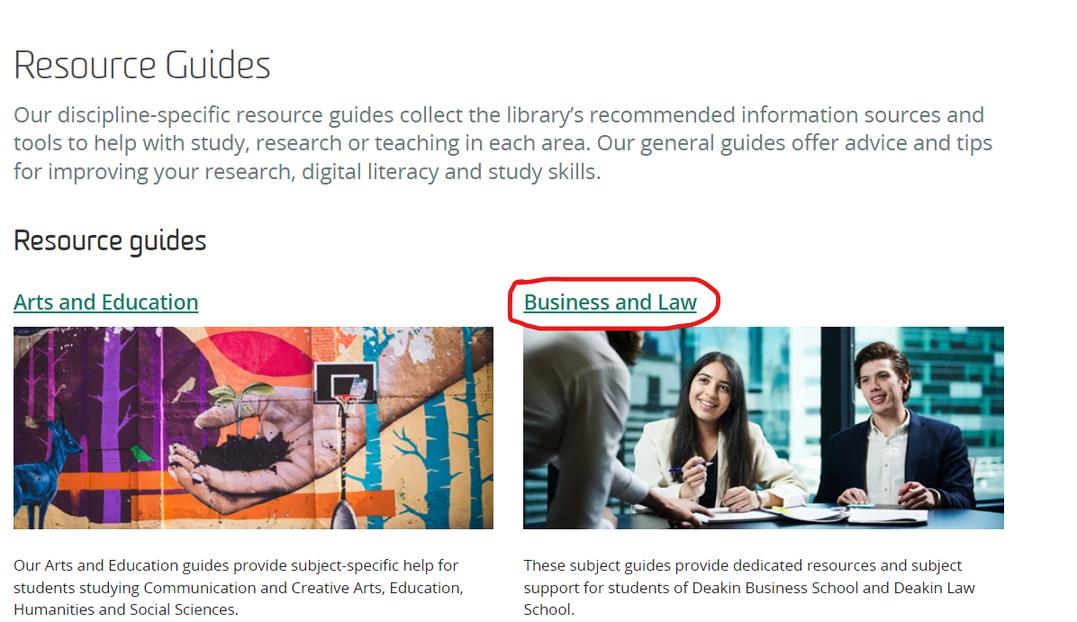

There you will find many law-related links that will take you to guides on various topics such as legal research, legal referencing, and legal abbreviations. The purpose of these guides is to provide students with useful resources to assist with their learning. The law resource guides include:
- Legal Research Basics
- Legal Abbreviations
- Legal Referencing
- Researching Case Law
- Researching Legislation
- Researching Secondary Law Sources
THE LAW LIBRARY
Resource Guides
Legal Research Basics Guide
This guide is an introductory guide on legal research. It outlines key books that may assist your legal research, research strategies/methods, tips on legal writing, study guides, information on the formation of international treaties/links to important treaties, examples of different referencing styles, a section on current awareness which includes recent developments in the law and unit help that offers resource guides specific for certain unit codes. You can find additional resources under most headings marked with a on the menu bar.
Legal Abbreviations
Legal Publication and Court names can be written in short-hand form. This guide assists in reading such titles and demonstrates methods on abbreviating too.
This guide also includes free PDF formats of the AGLC4.
Legal Referencing Guide
For legal referencing, we use the Australian Guide to Legal Citation 4th Edition (AGLC4). This guide shows you how to cite cases, legislation, secondary sources, treaties, internet materials and outlines various software that can be used for referencing purposes

Researching Case Law
This guide outlines how case law is a primary source of law, the lifecycle of a case, how to cite cases, a demonstration of how to search in Australian case citator databases, how to find Australian, UK and US cases and summaries on understanding legal abbreviations on law reports and law journal titles. Note: Case citators include an index of cases with brief summaries of each case.
THE LAW LIBRARY
Resource Guides
Researching Legislation
Legislation refers to Acts made by Parliament and delegated legislation. This guide outlines how to find legislation on free government websites, how a law is made in Australia, how to locate Bills and extrinsic materials used to create new Acts, a summary on the types of delegated/subordinate legislation, referencing legislation using the AGLC4 and how to locate principal and amending legislation using government websites and subscription databases.
Researching Secondary Law Sources
This guide shows you how to search for creditable secondary law sources via various legal databases. These secondary law sources include books, journal articles, dictionaries, legal encyclopaedias, news sources and Law Reform Commission publications. This guide also outlines how to reference secondary law sources using the AGLC4.
Distinguishing Between Sources of Law
Visit the following link for information regarding primary and secondary sources of law:
https://www.deakin.edu.au/library/skills-for-study/prepare-andplan/information-sources
LEGAL RESEARCH SKILLS
Using Legal Research Databases
Having a proper understanding of which databases to use and find sources will elevate your research papers and advance your legal knowledge.
There are two main databases which the Deakin library allows access to. These include Westlaw and Lexis Advance. However there are other sources such as Austlii and Halsbury Laws of Australia which provide useful and accessible information.
LEXIS AND WESTLAW

You can access Lexis and Westlaw databases through the Deakin library for free They are easy to locate via the databases tab by entering their names into the search function

You will learn how to navigate these databases in MLL110 - Legal Research and Statutory Interpretation.
You can also access this information on the library webpage under the Legal Research Basics page. You can access this information via this link: https://deakin.libguides.com/legal-research-basics
Using Legal Research Databases
Using Legal Research Databases

AUSTLII
Austlii is a free database in which you can find legislation and cases. It has a very easy to use search function that will help you navigate through.
Within Austlii there is an extremely valuable function called “note-up” This is useful when you wish to apply a relevant case to the rule or section of the legislation you are using.
Understanding how to use Austlii when reading legislation can be a secret weapon to help elevate your written work.
The Noteup function may not work for every Act or specific rule or section, but when it does it can provide you with case law to use as evidence for your argument as well as providing you with other sections of the Act that support your point.

LEGAL RESEARCH SKILLS
LEGAL RESEARCH SKILLS
Using Legal Research Databases
Halsbury Laws of Australia
You can access the Halsbury Laws of Australia in the same way as Lexis and Westlaw (through the library database page).
The Halsbury Laws of Australia provide valuable insight and explanation of the law as well as cases and legislation which will elevate your legal research and understanding The page is run by Lexis Advance and is easy to navigate. It is incredibly useful for Family Law, Constitutional Law, Criminal Law and many more.

ADVANCED SEARCHING
Firstly, it is important to identify the keywords in your research problem. Using these keywords, you can then decide on a research strategy.
To achieve more results, start generating synonyms for each of your keywords
Place your keywords and synonyms in each line of the advanced searching tool as demonstrated below:
Note: If you have two keywords that need to be kept together, such as ‘legal ethics’, place quotation marks around the two words to ensure they are perceived as one term in the search.

If the number of results achieved are too many, you can use limiters (located on the left-hand side of the page) to limit the number of results you achieve. You can limit publication date to achieve more recent results, limit by databases and limit the type of sources (e g selecting Scholarly peerreviewed journal articles will result in more credible sources of information).
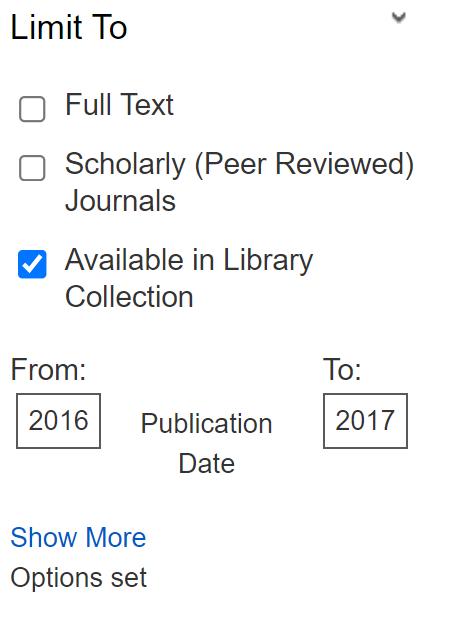

ADVANCED SEARCHING
A more detailed approach on Advanced searching can be found by downloading the search planner depicted in the image below
To access the search planner, click on ‘Skills for Study’ on the menu toolbar located on the top of the library page. Then click ‘Prepare and Plan’ > ‘Search tips and planning’.
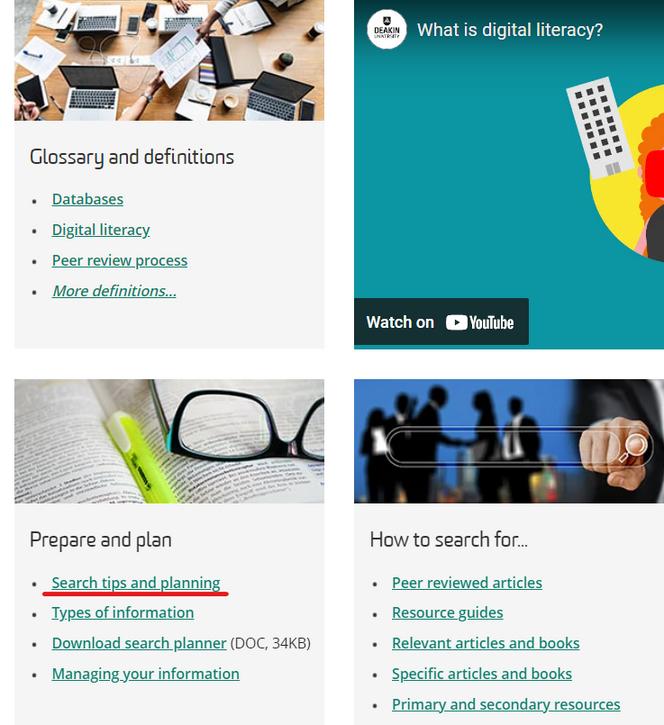


More on Advanced Searching can be found watching the following videos: Advanced searching video: https://youtu.be/vditpLZXdok
Finding Information by Keywords: https://youtu.be/kDD47wiQTfo
Identifying Search Terms: https://youtu.be/OPRSTCdMOM8
ADVANCED SEARCHING
BOOLEAN Phrases
On the Menu Toolbar located on the top of the library page, you will find links to several resources. Advanced Searching techniques such as the use of BOOLEAN phrases can be found under the third option ‘Skills for Study’ > ‘Prepare and Plan’ > ‘Search tips and planning’ under the subheading ‘Use search techniques.’ Under this heading, you will find a table as included below.
This table depicts the BOOLEAN search phrases/operators that can be used to narrow search results to achieve the desired result faster. There are worked examples and practice activities on how to use BOOLEAN operators if you scroll down on the library page.
More on Boolean Search Operators : https://youtu.be/jOrwmNYqvC8
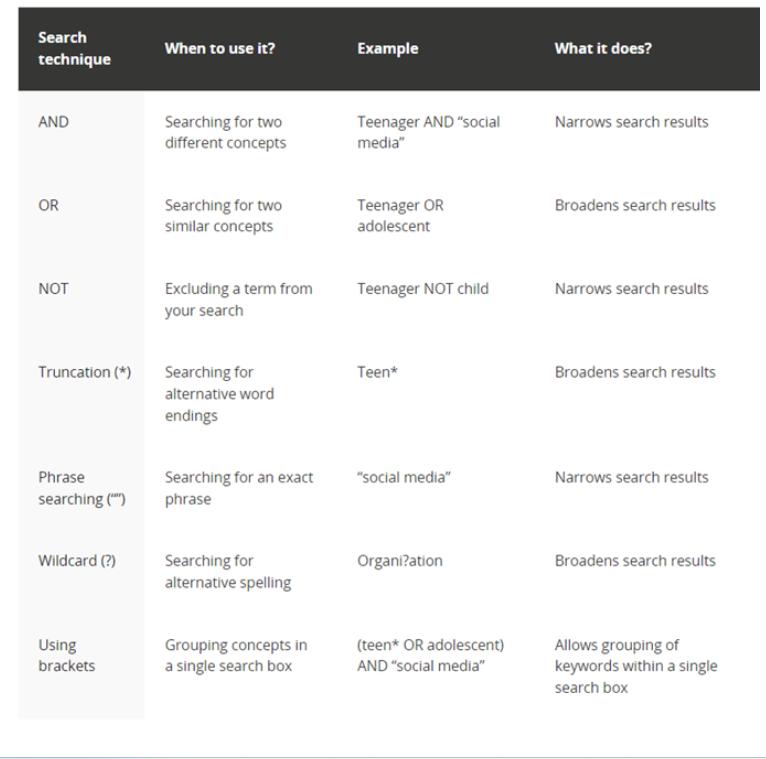
REFERENCING AND THE AGLC4
The Australian Guide to Legal Citation is a law student's best friend. Understanding and correctly identifying sources to cite and citing them properly are the easiest marks to get on an assignment It is crucial that you understand the basics of citation as well as how to navigate the AGLC4.
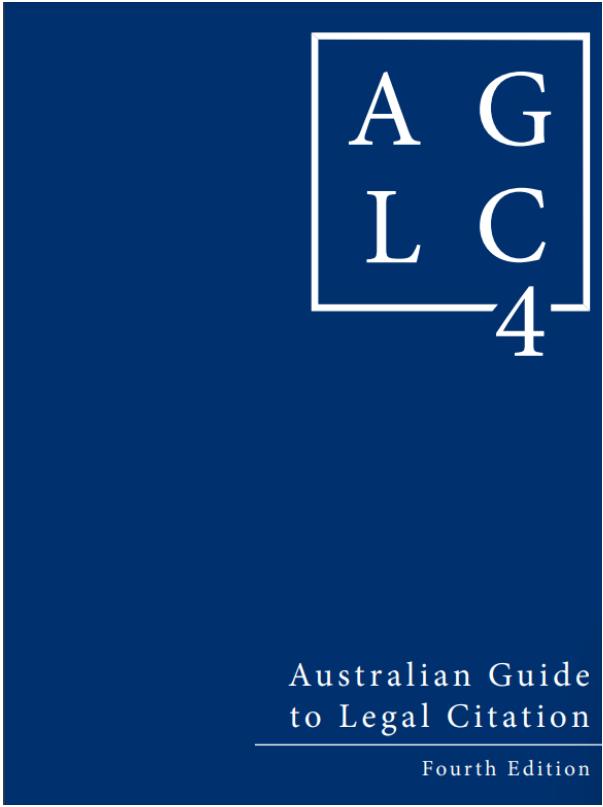
The Melbourne University Law School provides a free PDF online which you can access via this link:
https://law.unimelb.edu.au/__data/assets/pd
f _file/0005/3181325/AGLC4-withBookmarks-1.pdf.
You can use the control + F function to find what you are looking for quickly on the PDF version.
However, the physical copy is very handy to have. It has labelled tabs and distinct sections which help you be able to find what you are looking for with ease
The AGLC will assist you in understanding how to reference your assignment. It contains multiple examples as well as detailed instructions. The guide will help you format your footnotes and bibliography and will help you understand when/what to reference.
REFERENCING AND THE AGLC4
The guide is divided up into sections. The first chapter is general rules which includes general format of footnotes, citations, quotations, punctuation, capitalisation, italicisation, subsequent references, sources referring to other sources, number, dates and times and how to headings, titles and bibliography This section is the most important as once you get a solid understanding of the basics, the rest of the guide will be easier to follow.
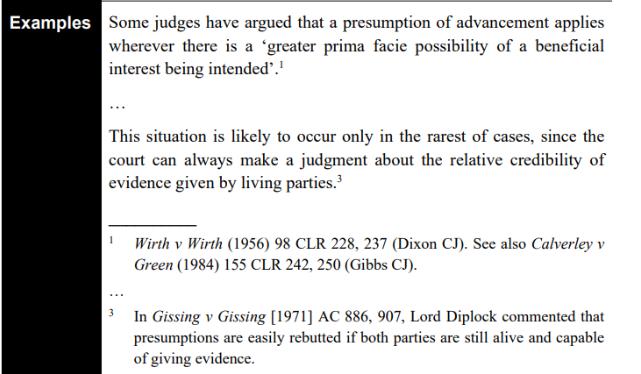
It is essential you understand how to use the AGLC4 properly as these are the easiest marks you can get on your assignment and can be the difference between a distinction and a high distinction.
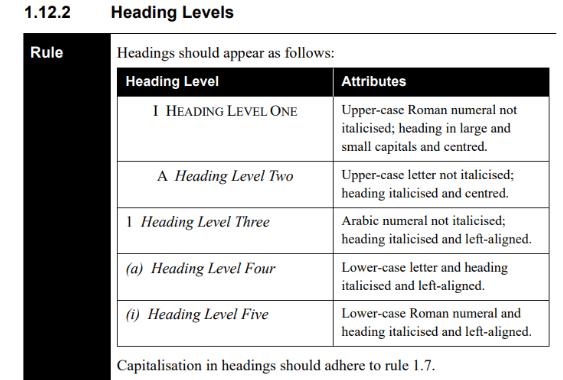
REFERENCING AND THE AGLC4
The guide then goes into different types of sources whether it be domestic, international, secondary or other foreign sources. Once you understand the basics, this will be easy to follow. These sections describe what sources will come under these headings and how to reference them. They provide detailed examples and explanations of each.
During the first couple of years in law school, you will only be using the General chapter and the Domestic Sources sections of the AGLC4.
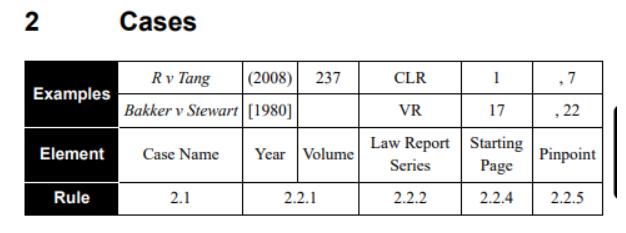
Hot Tips on Referencing!
The markers can be really pedantic about referencing so it's important to do it properly. They always say never to leave your reference until the last minute but we are all guilty of doing that. We recommend that as you go, include basic descriptions or links of where you found your information in your footnotes and at the end (preferably not last minute) go through every footnote and format them properly. You will find you have used the same source multiple times and will find that formatting case law or legislation will become easier as you go
REFERENCING AND THE AGLC4
Hot Tips on Referencing!
When reading case titles, such as Bakker v Stewart, the name that appears first refers to the plaintiff/the person bringing the action. The second name refers to the defendant.
When you see R within a reference eg. R v Tang, it is referring to the Queen or the Crown. Therefore, when reading the reference aloud, you must read it as “the Queen against Tang”
The “v” in citations are read as “against” or “and”. It is also improper to say “versus” or “v”.
Visit the following link for more resources and videos on referencing, interpreting case citations, searching for Australian cases/legislation and reading legal abbreviations.’
https://d2l.deakin.edu.au/d2l/le/content/187946/viewContent/ 4672263/View






 Chamodhi Polwatta
Editor Julia Hubbard
Chamodhi Polwatta
Editor Julia Hubbard



















